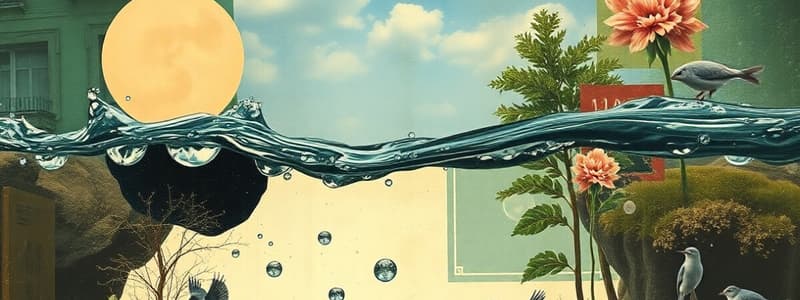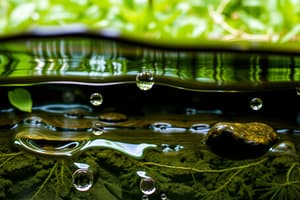Podcast
Questions and Answers
What percentage of Earth's water is fresh water suitable for use?
What percentage of Earth's water is fresh water suitable for use?
- 3%
- 70%
- 30%
- 1% (correct)
Which of the following statements accurately describes the state of fresh water on Earth?
Which of the following statements accurately describes the state of fresh water on Earth?
- Fresh water is primarily found in the oceans.
- Most of the fresh water is located in rivers and lakes.
- Fresh water is evenly distributed across the Earth's surface.
- The majority of fresh water is frozen in polar regions and glaciers. (correct)
What is the term for the substance that is dissolved in a solution?
What is the term for the substance that is dissolved in a solution?
- Solvent
- Mixture
- Solution
- Solute (correct)
Which activity is likely to be least affected by a scarcity of water?
Which activity is likely to be least affected by a scarcity of water?
What is one significant reason for water pollution?
What is one significant reason for water pollution?
What occurs when the saturated solution of copper sulfate is heated?
What occurs when the saturated solution of copper sulfate is heated?
Which statement best describes the effect of cooling a hot unsaturated solution of copper sulfate?
Which statement best describes the effect of cooling a hot unsaturated solution of copper sulfate?
Which of the following solutes is noted to have decreased solubility with increasing temperature?
Which of the following solutes is noted to have decreased solubility with increasing temperature?
What is the solubility of copper sulfate at 20°C?
What is the solubility of copper sulfate at 20°C?
Why is water considered essential for living organisms?
Why is water considered essential for living organisms?
What defines a solution in the context of water?
What defines a solution in the context of water?
Which type of water is considered the purest form of natural water?
Which type of water is considered the purest form of natural water?
Why can't water from seas and oceans be directly used for drinking or irrigation?
Why can't water from seas and oceans be directly used for drinking or irrigation?
What is the main source of groundwater?
What is the main source of groundwater?
What characteristic of water makes it a universal solvent?
What characteristic of water makes it a universal solvent?
What role does water play in temperature regulation?
What role does water play in temperature regulation?
Which living organism has the highest water content?
Which living organism has the highest water content?
How is water involved in food absorption?
How is water involved in food absorption?
What is a primary purpose of water in agriculture?
What is a primary purpose of water in agriculture?
What is one recreational use of water?
What is one recreational use of water?
Which statement about water's role in aquatic life is true?
Which statement about water's role in aquatic life is true?
Which of the following is NOT an everyday use of water?
Which of the following is NOT an everyday use of water?
Why is water often referred to as a solvent in biological processes?
Why is water often referred to as a solvent in biological processes?
What is the term for the maximum amount of solute that can dissolve in a given quantity of solvent at a specific temperature?
What is the term for the maximum amount of solute that can dissolve in a given quantity of solvent at a specific temperature?
Which of the following is NOT a recognized source of surface water?
Which of the following is NOT a recognized source of surface water?
What is a common control measure for reducing water pollution?
What is a common control measure for reducing water pollution?
Which of the following is a method of water conservation that can be practiced at an individual level?
Which of the following is a method of water conservation that can be practiced at an individual level?
What primarily distinguishes groundwater from surface water?
What primarily distinguishes groundwater from surface water?
What is water pollution fundamentally defined as?
What is water pollution fundamentally defined as?
Which of the following is NOT a cause of water pollution?
Which of the following is NOT a cause of water pollution?
What effect does eutrophication have on aquatic ecosystems?
What effect does eutrophication have on aquatic ecosystems?
What type of waste primarily contains harmful microorganisms leading to diseases?
What type of waste primarily contains harmful microorganisms leading to diseases?
How does thermal pollution impact aquatic life?
How does thermal pollution impact aquatic life?
Which pollutant is a direct result of excessive use of fertilizers in agriculture?
Which pollutant is a direct result of excessive use of fertilizers in agriculture?
What phenomenon results from acid rain affecting water bodies?
What phenomenon results from acid rain affecting water bodies?
What is a major consequence of oil spills in water bodies?
What is a major consequence of oil spills in water bodies?
What characterizes a saturated solution?
What characterizes a saturated solution?
Which factor does NOT affect the solubility of a solute in a solvent?
Which factor does NOT affect the solubility of a solute in a solvent?
How does heating generally affect the solubility of substances?
How does heating generally affect the solubility of substances?
Why do finer solute particles dissolve faster than larger particles?
Why do finer solute particles dissolve faster than larger particles?
What is the presumed aim of preparing a saturated solution of copper sulphate?
What is the presumed aim of preparing a saturated solution of copper sulphate?
Which of the following statements about insoluble substances is correct?
Which of the following statements about insoluble substances is correct?
What role does stirring play in the formation of a solution?
What role does stirring play in the formation of a solution?
Which of the following pairs exemplifies soluble substances in water?
Which of the following pairs exemplifies soluble substances in water?
What is the primary purpose of effluent treatment plants?
What is the primary purpose of effluent treatment plants?
Which of the following practices can help in reducing water pollution?
Which of the following practices can help in reducing water pollution?
What is a major consequence of excessive groundwater use?
What is a major consequence of excessive groundwater use?
How can drip irrigation contribute to water conservation?
How can drip irrigation contribute to water conservation?
What significant contribution did Rajendra Singh make to water conservation?
What significant contribution did Rajendra Singh make to water conservation?
What is the benefit of recycling industrial and domestic wastewater?
What is the benefit of recycling industrial and domestic wastewater?
What is one of the important reasons for conserving water as mentioned?
What is one of the important reasons for conserving water as mentioned?
Which method can increase rainfall according to water conservation practices?
Which method can increase rainfall according to water conservation practices?
Flashcards are hidden until you start studying
Study Notes
Water's Role in Life Processes
- Water is crucial for various life processes, acting as a solvent, regulating temperature, aiding plant growth, and supporting aquatic life.
- Water dissolves substances, allowing for food absorption and waste product removal within organisms.
- Water helps regulate body temperature through sweating and evaporation, maintaining a stable internal environment.
- Plants rely on water to produce food through photosynthesis and absorb nutrients from the soil.
- Aquatic ecosystems depend on dissolved nutrients and oxygen in water for the survival of plants and animals.
Water Content in Living Things
- The human body comprises approximately 70% water, emphasizing its vital role in biological functions.
- Milk, tomatoes, wheat, and eggs have varying water contents, highlighting its presence in food sources.
Everyday and Additional Uses of Water
- Water is essential for basic needs like drinking, washing, cooking, and bathing, demonstrating its fundamental importance.
- Hydroelectric power stations utilize water's energy to generate electricity.
- Agriculture heavily relies on water for irrigation, showcasing its indispensable contribution to food production.
- Water serves as a medium for transportation, facilitating the movement of goods and people.
- Various manufacturing processes rely on water for its properties as a solvent and coolant.
- Water provides recreational opportunities through activities like swimming, boating, and water skiing.
- Water is a crucial fire extinguisher due to its cooling properties, signifying its important role in safety.
Solubility of Copper Sulfate
- An experiment demonstrates the effect of temperature on the solubility of copper sulfate in water.
- Heating a saturated solution of copper sulfate increases its solubility, allowing for more solute to dissolve.
- Cooling the saturated solution results in the precipitation of copper sulfate crystals.
Solubility
- The solubility of a substance refers to the amount of solute that dissolves in a specific amount of solvent at a given temperature.
- Solubility is typically expressed in grams of solute per 100 grams of solvent.
- The solubility of most substances in water increases with increasing temperature.
Importance of Water
- Almost 70% of the human body is composed of water, emphasizing its crucial role in maintaining life.
Sources of Water
- Water can be classified into two categories: surface water and underground water.
- Surface water includes rainwater, water bodies like rivers, lakes, streams, and oceans, with oceans containing significant amounts of dissolved salts.
- Underground water, commonly known as groundwater, is collected above non-porous rocks and can be accessed through wells and tube wells.
Water as the Universal Solvent
- Water is considered the universal solvent due to its exceptional ability to dissolve a wide range of substances.
Water Pollution
- Water pollution occurs when undesirable changes alter the physical, chemical, or biological conditions of water, making it harmful to life.
- Common causes of water pollution include domestic sewage, industrial wastes, pesticides, oil spills, acid rain, garbage dumping, and thermal pollution.
Eutrophication
- Eutrophication is the excessive growth of algae and aquatic plants caused by excess fertilizers entering water bodies.
- This process leads to oxygen depletion, ultimately harming aquatic life.
Control of Water Pollution
- Measures to control water pollution involve treating industrial and sewage waste, recycling waste products, promoting organic farming, using biodegradable detergents, increasing forest areas, and utilizing recycled wastewater.
Conservation of Water
- Conserving water involves reducing waste without compromising daily life, important for industrialization, agriculture, and mitigating groundwater overuse.
How Can Water Be Conserved?
- Increasing forest areas can enhance rainfall, contributing to water conservation.
- Recycling and reusing industrial and domestic wastewater can reduce water consumption.
- Drip irrigation systems efficiently deliver water to plants, minimizing waste.
- Implementing rainwater harvesting systems efficiently captures and stores rainwater.
Rajendra Singh's Contribution
- Rajendra Singh and his organization, Tarun Bharat Sangh, have significantly impacted water conservation.
- They have constructed over 5000 water-harvesting structures and revived five rivers in Rajasthan, restoring life in drought-prone villages.
Concept Map
- A concept map visualizes the interconnectedness of water sources, characteristics, pollution, and conservation.
- The map highlights the relationship between surface water (rainwater, rivers, lakes, oceans), underground water (groundwater, wells), and water pollution.
Water in Everyday Life
- Water plays a pivotal role in daily life, from fundamental needs to technological advancements.
- Water's properties as a solvent, coolant, and energy source are indispensable in various applications.
Studying That Suits You
Use AI to generate personalized quizzes and flashcards to suit your learning preferences.




